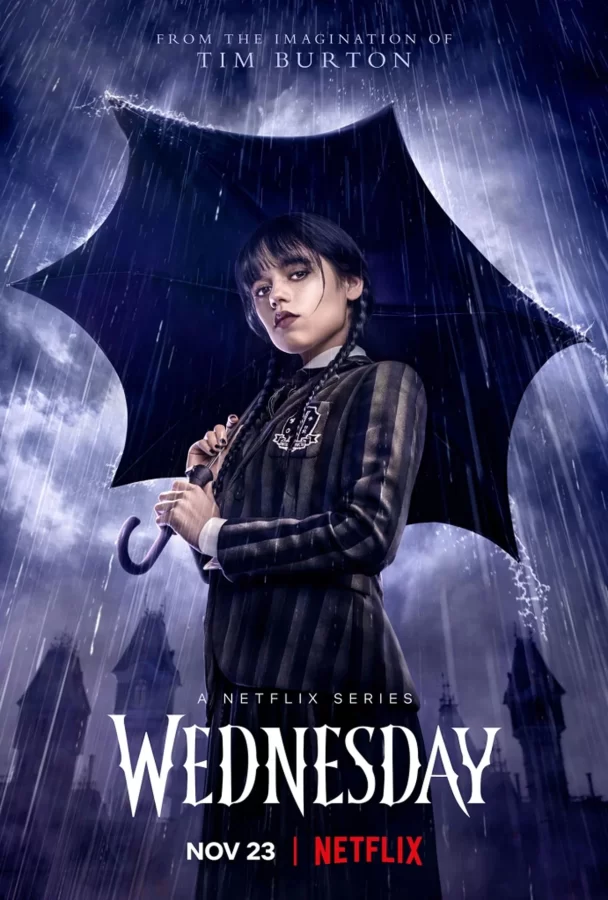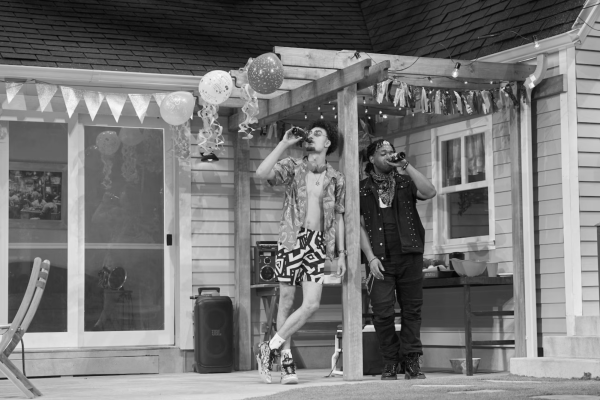Audiences Are Overthinking Netflix’s Wednesday
Jenna Ortega stars as Wednesday Addams in Tim Burton’s series Wednesday on Netflix.
Tim Burton’s Wednesday brings the beloved Addams family into the modern age. The show is a valiant attempt at appealing to the gloomy, horny, chronically online generation, but many Wednesday Addams fanatics found the show to be a reduction of her legendary character. The Netflixization of Charles Addams’ iconically grim characters may have disappointed some fans of the franchise or even Tim Burton himself. However, it is closed-minded to resist new depictions of the Addams family when, in fact, its characters have only left such strong marks on popular culture as a result of their continuous redevelopments.
The Addams family first appeared as unnamed characters in a recurring New Yorker cartoon panel drawn by Charles Addams beginning in 1938. In 1964 The Addams Family was turned into a sitcom, which named the characters Gomez, Morticia, Wednesday, and Pugsley Addams. After a number of adaptations, the franchise was revived in 1991 with the feature film series consisting of The Addams Family (1991) and Addams Family Values (1993). The characters have become pop culture staples, not only inspiring a number of spinoffs in various forms of media but also influencing goth subculture as a whole.
Wednesday is arguably the most recognizable of the characters. She is named in reference to the nursery rhyme line, “Wednesday’s child is full of woe.” In the original television series, a six-year-old Wednesday serves as a contrast to the oddities of the rest of her family. In the 1991 film, however, her personality evolved into a morbidly death-obsessed and sometimes homicidal child who has since become a goth icon. This evolution is in part due to Christina Ricci’s portrayal of the 13-year-old-girl thriving on schadenfreude with a taste for torture and an inability to display emotion.
Needless to say, the Addams family has become something of a trope in the American entertainment industry, and while not all of the spinoffs have been a success, the family and its name is nothing to be protective about. One of the major complaints about Tim Burton’s Wednesday is that it fails to honor the roles of the Addams family’s characters, Wednesday’s in particular. Because she is older, it makes sense for long-time Addams family fans to be shocked by the representation of their beloved iconic character. However, we must remember that the influence of the Addams family and Wednesday Addams would not exist without their adaptive nature, from medium to medium, spinoff to spinoff.
Wednesday’s general storyline is much like that of any other Netflix series: simple and melodramatic. Without the name Wednesday Addams backing the plot, the story of a tortured, quirky teenage girl at boarding school taking on a murder mystery and clearing her family’s name, all while juggling numerous suitors, sneaking around school administrators, besting her nemeses, and somehow avoiding schoolwork and responsibilities, is a tired trope. The show positions normies versus outcasts at every corner — a black-and-white composition which mimics a painfully cringey CW drama.
Although the style of the show has received criticism, other aspects, including Jenna Ortega’s performance as Wednesday, have been the subject of praise. Ortega serves as the first actor of Latinx descent to represent the canonically Latina Wednesday Addams. Many see this role as an attempt for Ortega to leave her Disney Channel career behind, and taking on Wednesday Addams has certainly proven her ability to suit new roles. Aside from Ortega, Wednesday has a star-studded cast, which is not unexpected in a Tim Burton project. Catherine Zeta-Jones and Luis Guzmán play Morticia and Gomez, Gwendoline Christie plays the principal of Nevermore Academy, and Christina Ricci, the actress of Wednesday in The Addams Family (1991), stars as Wednesday’s normie Nevermore mentor who — plot twist — has her own evil agenda.
While the simplicity of Christina Ricci’s original ensemble character in The Addams Family and Addams Family Values was possible in the form of a younger child, Jenna Ortega’s character in Wednesday faces more obstacles. As a teenager and the star of the show, she is now pushed to show a certain humanity in order to allow the plot and her character to develop over a number of episodes. The beauty of the original Wednesday Addams was in her deadpan charm and one-liners — but relying on this alone makes her an unsuitable focus for an entire show.
The one-liners that charmed audiences when coming out of a six- or 13-year-old Wednesday Addams in previous representations begin to reek of teenage entitlement in Wednesday, but part of that seems intentional. After all, this show is not supposed to be particularly deep or poignant, and, frankly, that was not the goal of previous Addams family entertainment either. Rather than evolving into a truly macabre story to satiate those desperate for gore and depth, figures such as the Addams family may be best kept as PG-13 entertainment, continuing to serve as gothic inspiration for generations through continued adaptations.











